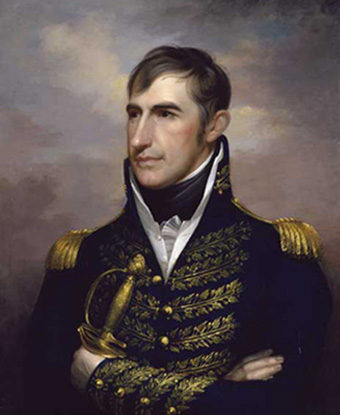Last updated: November 12, 2023
Person
William Henry Harrison

National Portrait Gallery, Smithsonian Institution
William Henry Harrison is known as the president with the longest inauguration speech, and the shortest term – he was Commander in Chief for only 30 days, 12 hours, and 30 minutes. But preceding his truncated presidency, his prolific formative years in Ohio and Indiana as a soldier, statesman, and governor from 1798 to the end of the War of 1812 reflect a personal story and political agenda that run parallel to the physical and ideological development of the Old Northwest.
One of Harrison’s most controversial political legacies is the role he played in shifting the government’s policy of land acquisition – from establishing treaties in the Jeffersonian tradition to taking land from American Indians and other nations by force. Harrison’s role as Governor of Indiana was to represent the needs of both new settlers in the Indiana territory, and American Indians already there. The responsibilities of the job, however, were contradictory. It was virtually impossible for Harrison to ensure the rights of American Indians while protecting the interests of the American government and expanding territory. He chose the latter as his focus, seizing millions of acres of land from the American Indians including two million acres along the Wabash River in 1809, claiming land that would become the present states of Indiana and Illinois. This encroachment, paired with the influx of white settlers resulted in increased Indian resentment and violence. Harrison quickly attributed these outbursts of hostilities to British intervention, not recognizing his own influence on exacerbating waning relations with the native people.
This conflict between territory and ideology came to a head in 1811, at the Battle of Tippecanoe. Tecumseh, a Shawnee chieftain familiar with white society and convinced of the threat of white cultural amalgamation, preached the idea of an Indian confederation of all nations which would bind them and their lands together against the Americans, establishing a headquarters near the confluence of the Tippecanoe and Wabash Rivers. As Tecumseh assembled a defensive army set to repel any American entering Indian territory, Harrison led an offensive force of 1,000 men to destroy the confederation.
The success at the Battle of Tippecanoe later propelled Harrison on to the presidency. With his running mate, John Tyler, he campaigned under the slogan “Tippecanoe and Tyler Too.” Although Harrison was born in Virginia, nostalgia for heroes of the frontier, and his populist image as an Indian fighter and military hero resulted in a landslide victory. Harrison’s presidency was short, but symbolic of the continued American obsession with military glory and unabashed westward expansion.
